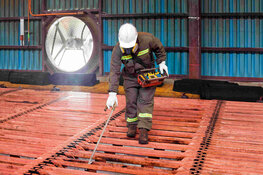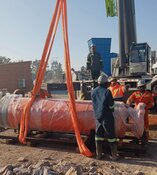Perpetua Resources Corp.'s (PPTA:TSX; PPTA:NASDAQ) Stibnite gold project in Idaho may become the U.S.' sole domestic source of antimony, the need for such intensified by China's imminent export restrictions on the metal, reported ROTH Capital Partners analyst Mike Niehuser in a Sept. 3 research note.
"Assuming the current timeline, which includes timely receipt of permits and no litigation, the Stibnite gold project may commence production in 2028," Niehuser wrote. "Perpetua remains confident that the final record of decision will be received by year-end [2024]."
Rating is Buy
ROTH reiterated its 12-month target price of $10 per share on the U.S. explorer-developer, now trading at about $8.90 per share, noted Niehuser.
From the current price, the target reflects an uplift of 12.4%.
Perpetua remains a Buy.
The problem in a snapshot
The U.S., lacking a domestic supplier, is running on low on antimony, a critical metal, and its primary source, China, is about to limit how much it will export to the States, Niehuser explained.
Last year, the U.S. consumed 22,000 tons of antimony, and the National Defense Stockpile contained only 1,100 tons of it, according to the U.S. Geological Survey, Niehuser pointed out. The U.S. needs antimony for its wide range of military applications, including 300-plus types of munitions.
The U.S. gets about 63% of its antimony from China, which intends to start restricting exports of the metal to the Western country starting Sept. 15. These controls are needed, according to China's ministry of commerce, "to further protect China's national security and interests and fulfill the nation's international non-proliferation obligations."
"In our opinion, this is a strategic move by China to diminish U.S. capabilities with ongoing conflicts in Ukraine, the Middle East and potentially Taiwan," Niehuser wrote.
Half of the world's antimony comes from China, which has about 32% of the global antimony reserves and about 48% of global mine production, USGS data indicate. Other countries producing antimony are Australia, Russia, Burma, Tajikistan and Turkey.
Two of the U.S.-friendly countries, Tajikistan and Australia, have substantial reserves and mine production but rely on China to process a large percentage of their concentrate, 78% and 86%, respectively. Thus, the bottleneck in the global antimony supply seems to be in processing and refining, Niehuser wrote.
A potential solution
Perpetua's Stibnite gold project has about 148,700,000 tons of antimony, enough to backstop about half of U.S. domestic antimony consumption for six years, based on USGS data from 2023, purported Niehuser.
"While any increase in antimony prices may marginally improve project economics, certainly relative to a sustained increase in the gold price, we believe that antimony's critical contribution to national defense should be a top interest of the Administration," the analyst wrote.
The price of antimony, specifically antimony trisulfide (Sb2S3, or stibnite), likely will remain elevated given the U.S. Department of Defense's unrelenting need for it, Niehuser added.
| Want to be the first to know about interesting Critical Metals investment ideas? Sign up to receive the FREE Streetwise Reports' newsletter. | Subscribe |








































